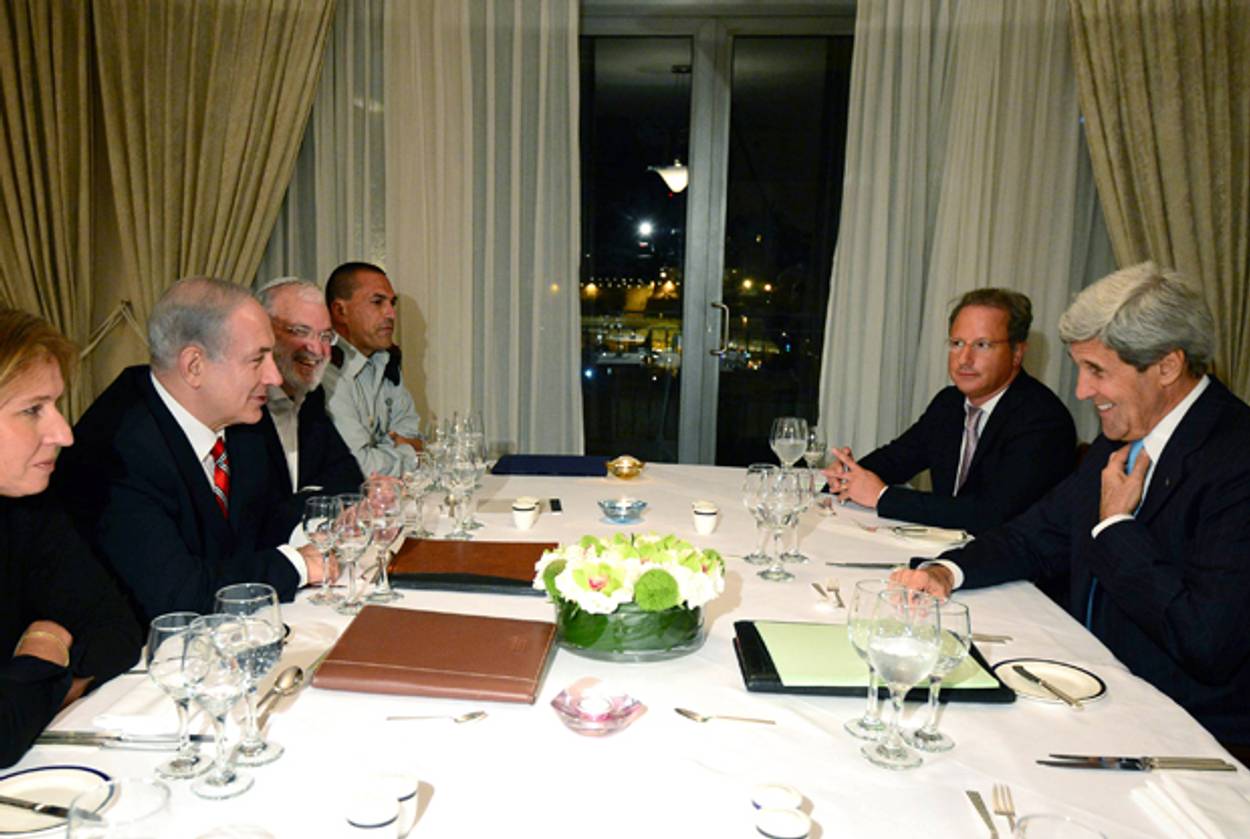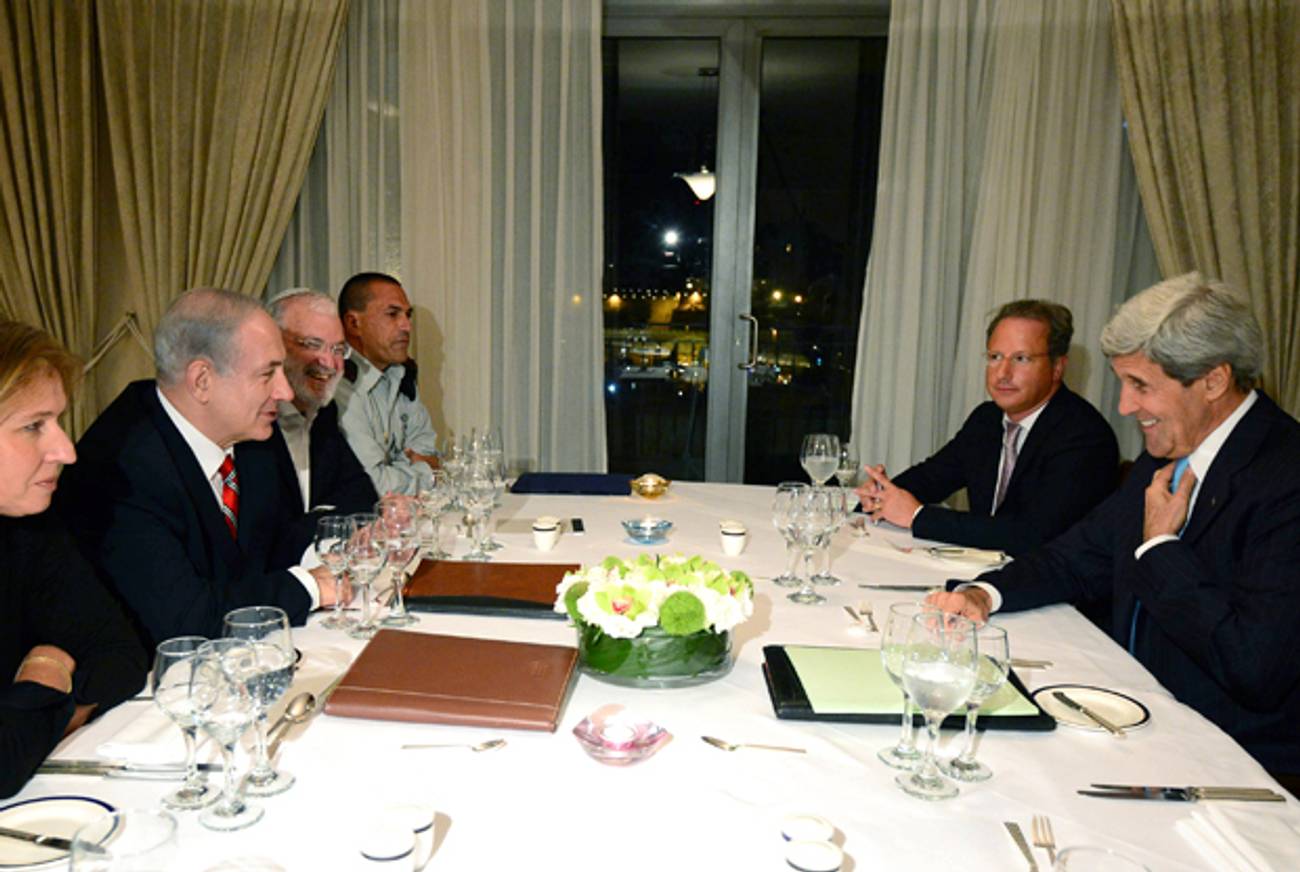The Inside Scoop on How the Kerry Peace Process Crumbled
How far were Netanyahu and Abbas willing to go?




Over at The New Republic, Tablet contributor Ben Birnbaum and co-author Amir Tibon have published a riveting account of the latest attempt to forge Israeli-Palestinian peace. Drawn from over 100 interviews with American, Israeli, and Palestinian sources, the piece traces the intricacies of Secretary of State John Kerry’s abortive bid to broker a peace agreement. Full of behind-the-scenes quotes from the principals, from President Obama to Tzipi Livni to Mahmoud Abbas, it makes for engrossing reading. Some highlights:
– As the negotiating window closed, Kerry shifted his efforts from achieving a comprehensive peace deal to hammering out a framework agreement that would guide future negotiations. But both he and President Obama’s inner circle were stymied by Abbas’s recalcitrance. Birnbaum and Tibon recount:
“Don’t quibble with this detail or that detail,” Obama said. “The occupation will end. You will get a Palestinian state. You will never have an administration as committed to that as this one.” Abbas and Erekat were not impressed.
After the meeting, the Palestinian negotiator saw Susan Rice—Abbas’s favorite member of the Obama administration—in the hall. “Susan,” he said, “I see we’ve yet to succeed in making it clear to you that we Palestinians aren’t stupid.” Rice couldn’t believe it. “You Palestinians,” she told him, “can never see the fucking big picture.”
– At the eleventh hour, and against his better judgment, President Obama authorized the release of convicted Israeli spy Jonathan Pollard to help Kerry extend the peace talks. (The move, designed to help Netanyahu mollify his right-wing flank and institute a West Bank settlement freeze, would ultimately fall through.)
Obama knew that Pollard was a third rail in the intelligence community; when President Clinton had toyed with a pardon, then–CIA director George Tenet had threatened to resign. Obama wasn’t going to touch the option unless it facilitated a true breakthrough.
Kerry was becoming desperate, though. At the Ritz, he explained to Obama and Rice that, without Pollard, the talks were days away from collapse (in part because of his initial miscommunication with Netanyahu). Obama wasn’t pleased. But late at night, after hours of talking, he gave Kerry the go-ahead. “I’m not doing this because I want to, John,” Obama said. “I’m doing this for you.
– Netanyahu and his advisers had an interesting reaction when they heard that the Palestinians had opted to join several United Nations conventions:
“Mr. Prime Minister, Abu Mazen has just signed fifteen U.N. conventions.” Netanyahu froze. For years, he had feared that the Palestinians might join the International Criminal Court and lodge war-crimes charges against Israeli officials. “Which conventions?” he asked. After several minutes of confusion, one of the people in the room managed to locate a list. Chuckling, he told the others that the Palestinians—the Palestinians—had signed the anti-corruption charter. The room burst into laughter.
But perhaps the most notable takeaway that emerges from the piece is how, in the words of the Washington Post‘s Dan Drezner, “compared to many in his ruling coalition, Bibi Netanyahu comes off as a moderate.” Indeed, as the negotiations progressed, Birnbaum and Tibon report how Netanyahu made greater and greater concessions, even as he faced stiff resistance from his right:
After decades of railing against any mention of the 1967 lines, Netanyahu accepted that “[t]he new secure and recognized border between Israel and Palestine will be negotiated based on the 1967 lines with mutual agreed swaps.” Said one Israeli official: “If the Israeli public knew back in February that Netanyahu agreed to include this sentence in the framework, it would have created a political earthquake.”
As the news leaked out, some even began to express guarded optimism — or disquiet:
Right-wing politicians, who had always been suspicious of Netanyahu, were becoming increasingly paranoid that something was being cooked up behind their backs, and those on the left were starting to express guarded hope. Nobody knew quite what to believe.
In December, Finance Minister Yair Lapid had asked Netanyahu what the odds were for achieving a framework. He was surprised at Netanyahu’s relative optimism. “Forty–sixty,” the prime minister had said. Following the Bennett fiasco, Lapid asked again. After a moment’s pause, the answer came back: “Sixty–forty.”
Why then did the process collapse, despite Netanyahu having moved into what U.S. envoy Martin Indyk has called “the zone of a possible agreement”? And can the two-state solution be salvaged? Read the full piece to find out.
Yair Rosenberg is a senior writer at Tablet. Subscribe to his newsletter, listen to his music, and follow him on Twitter and Facebook.